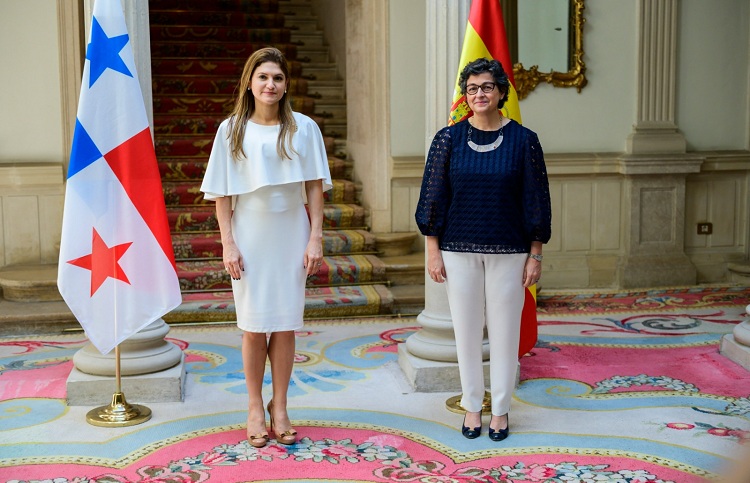Eduardo González
The Minister of Foreign Affairs of Panama, Erika Mouynes, yesterday invited Spain to lead within the EU the response of the international community to the wave of political arrests in Nicaragua, in order to facilitate “free, fair, credible and transparent elections” in this country.
Erika Mouynes was received yesterday at the ministerial headquarters of the Palacio de Viana, in Madrid, by the Minister of Foreign Affairs, Arancha González Laya, with whom she signed a Memorandum of Understanding on bilateral consultations and addressed various bilateral or regional issues, including the access of international funding to middle-income countries to “finance the health expenditure caused by the pandemic and boost the economic and social recovery of the Ibero-American community”, in the words of the Spanish minister.
Erika Mouynes made her official visit to Madrid as part of her tour of Europe to present Misión Panamá, a diplomatic strategy to promote a new international image of a country committed to the highest standards of transparency. In this regard, during the press conference following the meeting, González Laya praised the “great efforts” being made by Panama through “the Misión Panamá initiative” in favor of transparency, the fight against tax fraud and “the facilitation of the presence of companies and investors in Panama”, policies which, she assured, “will help the presence of Spanish investors in the country”.
For her part, Erika Mouynes assured that Panama is “extremely committed to transparency”, which, she explained, has translated into a series of “concrete measures” to put an end to its image as a tax haven, such as the suppression of banking secrecy or the decision to share information with 76 countries. “These are very serious and concrete measures that show that Panama has turned the page and is committed to transparency” and that have generated the “enthusiasm of the financial community”, she continued. “Panama is already a strategic partner”, with “a lot of political and social stability”, and all of this “we want to translate into Spanish investment”, she added.
Nicaragua
At the regional level, the two ministers addressed the current political crisis in Nicaragua, two weeks after both signed in San Jose, Costa Rica, together with their counterparts from Costa Rica, Belize, Guatemala and the Dominican Republic (and in the margins of the Spain-SICA Summit, Central American Integration System), a joint statement to demand the “immediate release” of the leaders of the Nicaraguan opposition recently detained by the regime of Daniel Ortega.
“It is not about Spain telling it what to do, it is about Nicaragua fulfilling its commitments to its own citizens”, warned González Laya during the press conference, in which she specified that, in “the last few weeks”, she herself has initiated “a discreet dialogue with the authorities so that they revert these measures that attempt against Nicaraguan citizens, their rights, their capacity to be political actors and the very basic functioning of Nicaragua”.
For her part, Mouynes asked Spain to be “a strategic ally” of Panama in its work as a “bridge” between Central America and the EU. “In a few days there have been many events in Nicaragua that threaten democracy and the possibility of free, fair, credible and transparent elections” and Panama, “as a hinge and bridge country, wants Spain to be a leader in Europe to ensure that the international community responds” to this situation. “What has happened puts the international community to the test once again, it happened to us in Venezuela and it is happening to us in Nicaragua, and it depends on all of us that we can give an effective and real response in the short term”, she warned.






